There are no products in your shopping cart.
Douglas Firs Were Our Sanctuary
This is not an easy post to read. It was not easy to live through or write. But it has been one of the most rewarding of my life. I hope the readers of Lumigrate find it helpful, especially around having those difficult, vital life-changing dialogues around what's really important. I would be interested to hear from any of you regarding your reactions, responses or impressions. Thanks--Beth
All the collages in this post were made by me as part of my process around A's death.
Solstice 2008 I posted about the life and death in 2003 of my dear friend Katrina. Her death somehow allowed me to complete a 20 year stint in hospice work. In 2009, again on summer solstice, I again posted about the death of a dear friend, although one whom I'd only physically known a short time. Our connections go deep, as she was the beloved of one of my former beloveds. That soul connection via an intermediary, T., helped us dive deep and go strong.
Oregon passed the Death with Dignity Act in 1997. At that time I was working in hospice in Colorado, and I remember the furor over this act, with the fears of 'slippery slope' being thrown down like a gauntlet. Although I voiced the party line 'hospice does not hasten nor prolong death', I secretly admired those plucky Oregonians and their cheekiness towards the federal government. State rights have prevailed and although there are always issues and opposition to any dialectic, Oregon has maintained the right for terminally ill patients to self-deliver lethal doses of prescription drugs to hasten their death. Here is the official 2008 report for the past 10 years of actual utilization of both the physicians' prescriptions written and the utilization of those prescriptions to end life.
One of the interesting although not unexpected issues in this report is that the actual usage of the prescriptions lags behind the request for them. This discrepancy speaks primarily to the comfort that the availability provides for those who are suffering: they know that they have the ability to choose to hasten their deaths if whatever their treatments, including hospice, does not alleviate their suffering.
The following is not a treatise in the rightness or wrongness of physician assisted suicide. It is a story told from a particular perspective of one brave woman's struggle and choice for self-compassion. Please honor this as a personal story and not a political statement.
Having moved to Oregon after supposedly concluding my hospice career, I'd never participated in a hastened death. In my 20 years of learning 'at the feet of the masters', i.e. the patients and their families, and later as an administrator who cared for the professional caregivers, I'd learned some about the organic process of dying. I knew next to nothing about what a more active stance would entail.
So when asked by A., in her late 50's and dying from metastasized sarcoma, to have a soulful, in-depth discussion about preparing her for hastening her death, I was both honored and a little anxious. I didn't believe I had experience in helping someone prepare to stop their life before a disease or accident did it more actively. But her request, because of the depth of connection I felt, and still feel with her, nudged me to say yes.
Below is a transcript of our dialogue over a 24 hour period, May 2-3, 2009. It was one of the most intense and rich experiences in my life. A. choose to end her suffering less than two weeks after this dialogue, and although I was not there in body when she left I was there in spirit, applauding her courage, grace and dignity.
Also included are collages I have worked on since then, honoring both her beautiful life and graceful passage. I believe A. has been helping me with them.
The following conversation is almost verbatim as A. asked me emphatically to write it all down. I did so before I left her home. She had a printed copy and apparently read it several times in the following two weeks. The dialogue somehow served as a touchstone and a grounding for her in those last two weeks, as she did her final preparations.
I am B., by the way! Beth, Virtual Tea House host
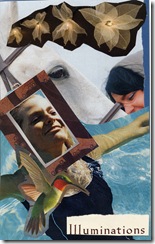
My experience of what A's last breath might have been like. Notice her horse is present and accounted for.
A conversation
May 2, 2009
We walked with A. in her wheelchair to a place on her beautiful property. A. took occasional hits of her medical marijuana. She told me that the marijuanna had truly been a gift through her illness, alleviating many distressing symptoms. I smoked a hand-rolled tobacco cigarette. We found a place to sit under some ancient dripping Douglas Firs. I sat on the bottom of an overturned canoe. There were lots of spaces for silence in this conversation.
She started the conversation very directly.
A: I feel so fuzzy. Do you think my grogginess is a function of me checking out emotionally?
B: My perspective only: it’s a physiological function of the disease process as well as a side-effect of the powerful drugs you are taking to manage the disease symptoms.
A: I like thinking that it’s a physiological function. That’s pretty helpful, actually. I feel there are powerful forces, things going on in my body. I…where do we begin?
B: Hm…let’s start at what the issues are that might be keeping you from being peaceful, or are distressing in some way.
A: Well, there are decisions.
B: Can you say some more about the decisions?
A: Well, I feel like I have no experience in dying.
B: I paused, asking silently for some guidance, which quickly came. I am wondering if you’ve actually had lots of experience. Not in physically dying, but other kinds, all through your life.
A: Like?
B: Like a divorce. Like other hard leavings in your life. Like all the animals you’ve euthanized.
A: That’s true. I guess I have had some practice. In the emergency vet clinic that was a lot of my practice. There were nights when I’d have to euthanize 5 animals in a single shift.
B: And were you present for the animals and their humans?
A: The best I could be.
B: So what do you know about the right time and all that is necessary for a 'good' euthanizing?
A: The people have to be ready.
B: And the place—what about the setting?
A: It should be peaceful.
B: What else? What about the animal itself? And the method?
A: Yes, the animal needs to be ready. They’re usually ready before the people. And the method needs to be humane and appropriate.
B: So we’ve got the animal ready, the people ready, the setting peaceful and an appropriate method. You really know a lot about this.
A: Yes, I’m not really afraid of dying, although I’m not looking forward to it. It’s just the pain. I don’t want to make decisions out of a state of pain.
B: Seems like there are at least 2 scenarios. One where you let the natural process take its course and somewhere along the line, you make a decision to not make a decision and you just slide on out. The other is where you know that you are going to make a decision and it’s just a question of when.
A: So how do you know when?
B: You’ll know.
A: I’ve always been a little glib in saying that to others. How the hell do I know that?
B: That showed a bit of hubris on my part to say that. I apologize.
A: And yet, it’s true, I will know.
B: I also believe that. (Silence.) Have you ever watched the documentaries where one wild animal is the predator and another is the hunted? Many times before the final moment there seems to be an exchanged glance between them that seems to be asking ‘is it the time?’ Some understanding passes between them and it’s done.
A: Yes, I’ve seen that as well. So…my disease is my predator?
B: You could see it that way. So 'the time' is when you have that moment of understanding and allowing and turn to look at death full in the face and say 'yes'…
A: That’s very helpful.
B: In many other cultures death is not such a scary thing. Maybe religion has placed a level of meaning on something that is basically an unknown, a mystery, an organic event, but not something to be feared. Note: there’s a discussion about the purpose religion may play in keeping society in 'proper' order that isn't included here.
A: Yes. Death is an interesting physiological phenomena. Have you studied it much? Note: here’s a conversation about my experience with death and dying and about her curiosity at the mystery of it all. What is death, anyway?
B: I guess you could stand back a bit and ask 'and what is life,' for that matter?
A: Oh, yes, that’s a helpful way to think about it.
This collage was my experience of A's soul during our time together. Grieving, ancient, open. Still delighting in blueberries.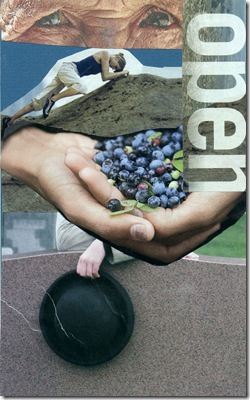
There’s a conversation about death being artificially separated from living in our culture. We also talk about my work with children's grief, and what they taught me: grief is to be dosed, interspersed with play and peanut butter sandwiches. And we also talk about how death may be like life a type of dream-state. We both have great wonderment about all this and sit in silence a great deal during the conversation.
B: And in other cultures, such as in some Mexican mythology, beings are born with life and death together in the same crucible. Death is then one’s constant companion throughout life instead of a stranger.
A: Hm! That’s interesting. But what would make death then come to the forefront, to become prominent instead of behind our shoulder?
B: I’m not sure. That’s part of the mystery. But animals and plants do not seem to fear death. They are competitive for space and nutrients and instinctively try to live, but the actual piece of dying doesn’t hold meaning for them. Maybe that’s where religion has gotten in the way—it’s put a layer of ‘meaning’ on death and the afterlife that is not organic. Plants and animals show us a different way to be with death.
Long silence while the trees drip and the cats wind around our legs and purr.
B: What do you think happens to the essence of us when we die?
A: I’m not sure, but it seems like we break up into particles that are constantly being reformulated into new life. Like these little dancing shiny particles in the air right now. Can you see them?
B: No, damn it, I can’t! But I believe they’re there!
A: They’re all around us, and the cats are hanging around too. The cats like the particles and they’re curious about you, B., and who you are and what you’re doing. It’s pretty interesting!
B: Hah! They are surely hanging out! We are both smiling, petting the cats. More silence.
A: I sometimes wish I had more of a path.
B: Tell me about that, can you?
A: I think it’s helpful to have a spiritual path of some sort. Maybe it helps you when you come down to dying?
B: Sometimes it seems to, but not necessarily. The people that I’ve noted their deaths as ‘well-done, graceful exit, stage left’ are those that have practiced dying throughout their lives, so they 'get it'. When it’s done they slide on out, without a hitch. They have made practicing dying their spiritual path. In that paradigm, you've been practicing your path your entire life.
A: Hm. Practicing. Tell me about that again, my brain doesn’t hold on to these things, but I know that what you just said is important.
Note: we then talk deeply about her experience of being with dying throughout her life and that all she’s lacked is a consciousness, a languaging for this.
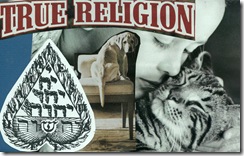
This collage is an attempt to put A.'s innate kindness into image her path was kindness.
A: Yes, but an acknowledged path, wouldn’t that help with the practicing?
B: It does help some, but it’s not necessary. Would it be helpful for me to lay out for you how I perceive your particular path? It is just my perspective, though. I believe, and again it's just my definition, that our paths are nothing more than how we engage with life and the quality of connections that we have.
A: Sure.
B: You have a host of very good, deep, ancient friendships. You have sweet connections with your children, your animals, this land, your home, T. You’ve lived an extraordinary life in the quality of your connections. You have helped people and animals in your practice. You have helped in other countries, working to make your corner of the world a more peaceful place. Your partner, T. is *anamcara to you, and willing to do whatever it takes to help you through this. That’s a remarkable thing, to end one’s life with all that richness of connection!
A: Are you saying that I could be extremely grateful for all that?
B: That’s an option…
We both laugh out loud. Then A. is very quiet, very still, looking at the sparkles of light…
A: I wish you could see the sparkles.
B: Me too!
A: What about J? (A's daughter) How will she do? I was present for my mother’s death. It was very peaceful, a very good death. And I’ve never felt disconnected from her. For awhile after her death I was almost peeved—like, I can’t get away from her! But now, I’m so glad, it’s almost like she’s part of me.
B: Ah! And have you noticed any difference in that connectivity since you’ve known that you are yourself dying?
A: Well, I’m glad she does not have to witness this, my decline. But then again, how do I know that she isn’t?
B: Have you noticed any more/less connection with her?
A. Yes, actually more connection.
I don't say anything, but she sees the inference about her own daughter's process. More silence.
A. Are you getting cold? Should we go towards the house and get a blanket or you?
B: Yes, that would be good.
We move towards the house, settle in with blankets on the walkway.
A: So, how do I move towards my death, less fearful? How do I know when it’s time?
B: It might help you to identify the necessary ingredients again (we do this together): timing; people who are going to be staying on this side and their preparation; setting; method. So, if you were looking at a stage at this scenario, how would it look?
A: On the deck that T. built. T. is by my side. All my animals are around, except my horse. The birds are all over these feeders, talking trash. My kids... Where is J in this setting?
B: Where do you want her to be?
A: I don’t know where she wants to be.
B: Important question to ask her. You have more conversations with her that need to take place. She cannot be disconnected from you and this important event, but she doesn’t have to be physically present. Same for M.( A's son)
Note: a conversation takes place about the differences between how males and females relate to difficult emotional material, how they grieve. A. gives some input about how her son and daughter may do with this. And T.
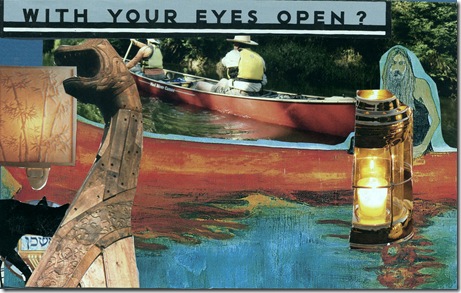
This card depicts the passage over the River Styx with Charon as ferryman. In the background is A. and T.'s canoe. A masthead from a Viking ship wanted to be in the collage, too. There's ample light to guide the passage.
A: I guess it’s important to make a plan isn’t it. So that it isn’t that pain makes the decision about how it all comes down.
B: That would seem to be helpful. You also have the other option we talked about—just sliding into it…
A: Well, that doesn’t seem to be as pro-active or responsible to me.
B: The people who are around you and care for you learn different things in that scenario, equally important. Your children are taking this all in on a very deep level, and no matter how you go out, they are learning about living and dying from you.
A: Yes, that’s how I see it too.
We go in to the house for dinner. A. still has a wonderful appetite and we share a delightful meal that T. has prepared with great love. It is with exquisite ordinariness that we laugh, talk, joke and enjoy the meal and each other.
Later, we all read and then I am honored to give A. a foot and leg rub that is delightful to her, nourishing to me, and helps her go to sleep.
The next morning we putz about, and when the sun comes out, we go out and sit in the place that A. has identified as where she may want to be when she leaves. We sit and talk, T. joins us, it starts to rain and we sit in the rain, under the umbrella, with our hearts engaged, talking about life and death as if they were Siamese twins joined at the heart.
Awhile later, I get in my car to leave for my journey home. I know I will not see A. again, but our paths have joined for eternity. She is my beloved teacher, my mentor, an honored guest in my heart-home.
On my way home over the Cascades, I stop by a river and take a nap. I wake up knowing that my work is done. I will be a support for A. and T. but I can rest now.
Her death was a thing of great beauty, as described by T. A's hospice nurse was immensely helpful. A. was surrounded by her children, pets, garden and T, just as we had laid it out.
A's memorial service a week or so later at her home and gardens was attended by many who wanted to honor this woman's compassionate life the same woman who in her humility feared she had no path.
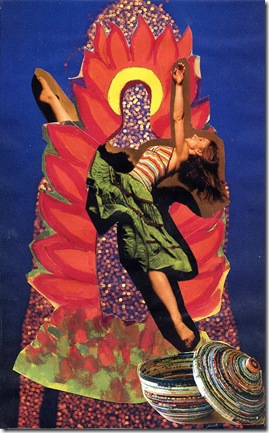
'Freedom from the known'. This expresses what I sensed A's experience was moments after she left her beaten down body.
I have been forever altered by this experience, in ways I can't yet express. I am grateful to A. for allowing me to walk beside her during this brief time. And a huge thank you to T. for allowing me to publish this so soon after A.'s death.
NOTE: T. published some of his thoughts about this experience here on the Virtual Tea House a few months later. It was enlightening to read his perspective.
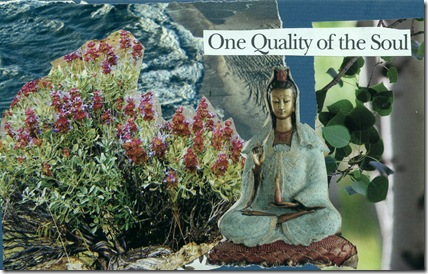
This collage is in honor of the gracefulness of A's life and death.
*Anamchara/anamcara—a soul friend who in a perfect world is with you through most of your existence, including your death. For most of us these days it is someone who commits to walking beside us through the difficult parts of our journey, and themselves waking up as they help us wake up.
I am a grandmother. I'm owned by a wolf/husky named Geronimo and we live in Central Oregon. I thrived in Western Colorado for 13 years--living in Hotchkiss and working for Hospice and Palliative Care of Western Colorado in the administrative offices in Grand Junction and helping to open the hospices in Montrose and Delta.
I have a MA in Religion, and 20 something years of hospice experience, 5 years in child advocacy and am now working with eldering.
I own a business called Finding Ground and also host a multi-blogger site Virtual Teahouse. Finding Ground provides spiritual companioning for those who are journeying through major life transitions. All I do is 'sit' and hold space. And show up. I do face to face sessions as well as long-distance via phone or skype sits.
Other than those facts, everything else is suspiciously, serendipitously, unscrupulously subjective.
I am a grandmother. I'm owned by a wolf/husky named Geronimo and we live in Central Oregon. I thrived in Western Colorado for 13 years--living in Hotchkiss and working for Hospice and Palliative Care of Western Colorado in the administrative offices in Grand Junction and helping to open the hospices in Montrose and Delta.
I have a MA in Religion, and 20 something years of hospice experience, 5 years in child advocacy and am now working with eldering.
I own a business called Finding Ground and also host a multi-blogger site Virtual Teahouse. Finding Ground provides spiritual companioning for those who are journeying through major life transitions. All I do is 'sit' and hold space. And show up. I do face to face sessions as well as long-distance via phone or skype sits.
Other than those facts, everything else is suspiciously, serendipitously, unscrupulously subjective.
This forum is provided to allow members of Lumigrate to share information and ideas. Any recommendations made by forum members regarding medical treatments, medications, or procedures are not endorsed by Lumigrate or practitioners who serve as Lumigrate's medical experts.


![Expand cart block. []](/sites/all/modules/ubercart/uc_cart/images/bullet-arrow-up.gif)


Please look for much more from Beth's amazing work in the spirituality forum, as well as others. There is another piece located in this same forum (about the 'home stretch'/end of life issues) which might help people reading to know how people might handle the process after what Beth addresses in this wonderful piece, for which I am so GRATE-full. For your ease, the link to it is:
www.lumigrate.com/forum/katrina-remembered-“yes-my-love-how-it-goes”
I do believe these are amazingly powerful pieces Beth has shared with us, and my hope is for them to assist those finding them. OR that they remember us to come back in the future when it is something which of more immediate benefit.
~~ Mardy
This topic also resides in the forum on Spiritality, and was appropriate to include in this forum which has a focus for those seeking information and support related to end of life issues. Or, again, as I prefer to call it: The Home Stretch.
Live and Learn. Learn and Live Better! is my motto. I'm Mardy Ross, and I founded Lumigrate in 2008 after a career as an occupational therapist with a background in health education and environmental research program administration. Today I function as the desk clerk for short questions people have, as well as 'concierge' services offered for those who want a thorough exploration of their health history and direction to resources likely to progress their health according to their goals. Contact Us comes to me, so please do if you have questions or comments. Lumigrate is "Lighting the Path to Health and Well-Being" for increasing numbers of people. Follow us on social networking sites such as: Twitter: http://twitter.com/lumigrate and Facebook. (There is my personal page and several Lumigrate pages. For those interested in "groovy" local education and networking for those uniquely talented LumiGRATE experts located in my own back yard, "LumiGRATE Groove of the Grand Valley" is a Facebook page to join. (Many who have joined are beyond our area but like to see the Groovy information! We not only have FUN, we are learning about other providers we can be referring patients to and 'wearing a groove' to each other's doors -- or websites/home offices!) By covering some of the things we do, including case examples, it reinforces the concepts at Lumigrate.com as well as making YOU feel that you're part of a community. Which you ARE at Lumigrate!